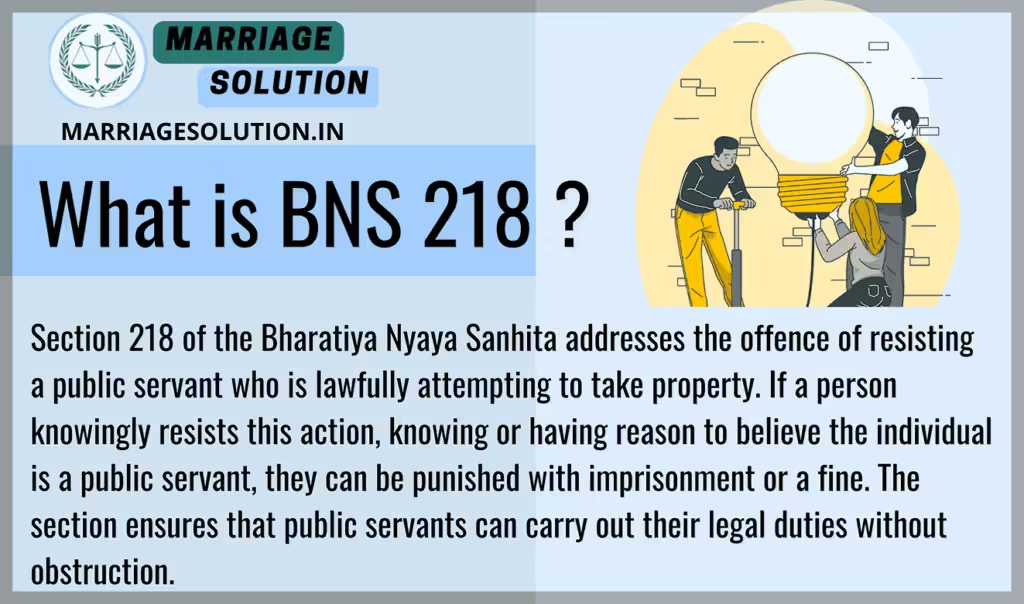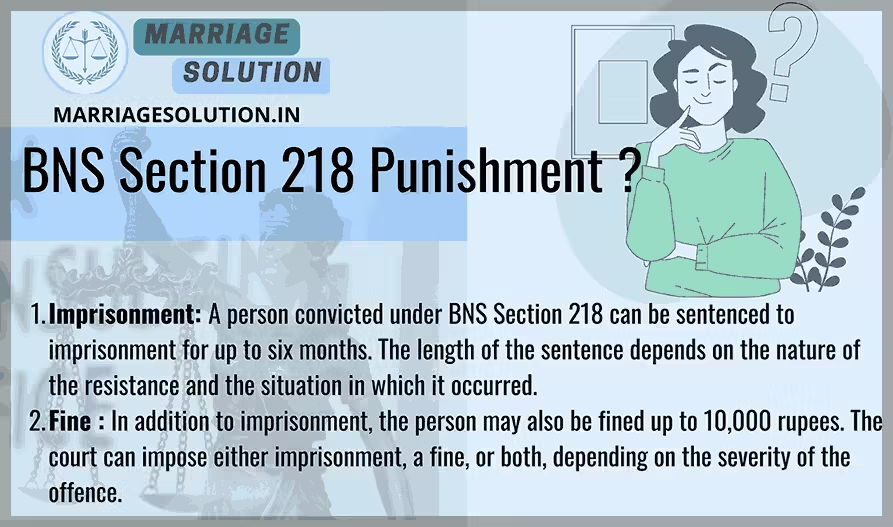Introduction of BNS 218
BNS 218 of the Bharatiya Nyaya Sanhita deals with resisting the lawful authority of a public servant during the taking of property. If a person knowingly obstructs or opposes such lawful actions, they can face imprisonment or a fine. This law safeguards public servants while ensuring that legal duties like tax recovery, confiscation, and court enforcement are carried out without resistance.
The Bharatiya Nyaya Sanhita (BNS) Section 218 replaces the old Indian Penal Code (IPC) Section 183.
What is BNS Section 218 ?
Section 218 of the Bharatiya Nyaya Sanhita addresses the offence of resisting a public servant who is lawfully attempting to take property. If a person knowingly resists this action, knowing or having reason to believe the individual is a public servant, they can be punished with imprisonment or a fine. The section ensures that public servants can carry out their legal duties without obstruction.

Under Section 218 of the bns act 2023
“Whoever intentionally resists or obstructs a public servant in the lawful exercise of their authority to take possession of property, knowing or having reason to believe that the person is such public servant, shall be punished with simple imprisonment up to six months, or with fine up to ₹10,000, or with both.”
1. Meaning of “Resistance to Taking Property”
- It means blocking, opposing, or refusing to allow a public servant to lawfully take property.
- Property may be seized for reasons like tax recovery, investigation, confiscation, or enforcement of a court order.
- The offence is only complete if the public servant is acting lawfully and the person resisting knows or should reasonably know that they are an authorized officer.
2. Who is Covered?
This section applies to:
- Any person resisting the lawful act of a public servant.
- Property owners who physically or verbally oppose seizure of goods.
- People helping the owner or others in blocking public servants’ lawful authority.
3. Nature of the Offence
- Non-cognizable → Police cannot arrest without a warrant.
- Bailable → Accused has the right to bail.
- Non-compoundable → Cannot be settled privately, must go through court.
- Triable by any Magistrate → Handled at the local level by a Magistrate.
4. Examples of BNS Section 218
Example 1 – Tax Seizure
A tax officer comes to seize goods from a shop for unpaid tax dues. The shop owner physically blocks the officer despite knowing he is authorized. The owner is guilty under Section 218.
Example 2 – Police Confiscation
Police arrive to confiscate a stolen car. The suspect resists and prevents them from towing it away. Since the officers are lawfully authorized, resisting them amounts to an offence under Section 218.
Example 3 – Not Guilty Case
If an officer acts beyond authority or seizes property without legal order, resistance may not fall under Section 218 because the act was unlawful.
5. Punishment under BNS Section 218
- Imprisonment → Up to 6 months.
- Fine → Up to ₹10,000.
- Both → Court may impose both penalties depending on severity.
6. Importance of BNS Section 218
- Ensures smooth enforcement of lawful authority.
- Protects public servants from unlawful resistance.
- Maintains respect for government and court orders.
- Prevents obstruction in legal investigations and enforcement.
Section 218 BNS Overview
BNS Section 218 refers to the resistance against a public servant when they are lawfully taking possession of property. This law states that if someone deliberately tries to resist the lawful taking of property by a public servant, knowing that the public servant is acting within their legal powers, they can face legal penalties. The law enforces accountability to prevent disruptions in the execution of lawful duties.
BNS Section 218 in Simple Points (10 Key Points)
- Resistance to Property Takeover
BNS Section 218 punishes anyone who resists the lawful act of a public servant taking property. This property could be confiscated as part of an investigation or for legal reasons, and resistance against this act is considered a crime. - Knowing the Public Servant’s Authority
The individual must know, or have reason to believe, that the person taking the property is indeed a public servant. This clause ensures that resistance is punishable only if the person being resisted is recognized as having the lawful authority to act. - Lawful Authority
The public servant must be acting within their lawful authority, which means they are performing a legal duty, such as seizing property for an investigation or enforcing a court order. This section does not apply if the public servant is acting unlawfully. - Imprisonment for Up to Six Months
If found guilty, the person who resisted the lawful taking of property may face imprisonment for up to six months. The duration of imprisonment depends on the circumstances of the resistance and the legal proceedings. - Fine of Up to 10,000 Rupees
In addition to imprisonment, the individual may also face a fine of up to 10,000 rupees. This fine serves as a financial penalty to deter such actions and ensure compliance with legal orders. - Non-Cognizable Offence
This is a non-cognizable offence, meaning that the police cannot arrest someone without a warrant. They cannot act on their own discretion; the matter must be brought to court before an arrest can be made. - Bailable Offence
Being a bailable offence, the individual can apply for bail, and if granted, they may be released during the trial process, before the completion of their case. - Triable by Any Magistrate
This offence can be tried by any Magistrate, depending on the seriousness of the case. It could be handled in any court of law that has jurisdiction, typically in the local court where the incident occurred. - Non-Compoundable
The offence under this section is non-compoundable, meaning it cannot be settled through an out-of-court arrangement between the parties. The matter must be handled through legal proceedings. - Protection of Public Servant’s Lawful Powers
The essence of this section is to ensure that public servants can carry out their lawful duties without facing unlawful resistance, ensuring that legal processes and procedures are followed smoothly.
Example 1:
A public servant, such as a tax officer, arrives at a property to seize goods that are owed as part of unpaid taxes. The owner of the property physically tries to stop the officer from taking the goods, knowing that the officer is legally authorized to seize the property. In this case, the property owner would be committing an offence under Section 218.
Example 2:
During a police investigation, a public servant arrives to confiscate property that has been linked to a criminal activity. The person whose property is being taken physically stops the officer, even though they know the officer is acting lawfully. Here, the person can be charged under BNS Section 218 for resisting the public servant’s lawful actions.
BNS 218 Punishment
- Imprisonment
A person convicted under BNS Section 218 can be sentenced to imprisonment for up to six months. The length of the sentence depends on the nature of the resistance and the situation in which it occurred. - Fine
In addition to imprisonment, the person may also be fined up to 10,000 rupees. The court can impose either imprisonment, a fine, or both, depending on the severity of the offence.

BNS 218 bailable or not ?
BNS Section 218 is a bailable offence. The accused has the right to request bail and, if granted, can avoid remaining in custody during the trial process.
Comparison: BNS Section 218 vs IPC Section 183
| Section | What it Means | Punishment | Bail | Cognizable? | Trial By |
|---|---|---|---|---|---|
| BNS Section 218 | Addresses resistance to a public servant lawfully taking possession of property. If a person knowingly obstructs such lawful action, they are punishable under this section. | Simple imprisonment up to 6 months, or fine up to ₹10,000, or both. | Bailable | Non-Cognizable | Any Magistrate |
| IPC Section 183 (Old) | Punished anyone who resisted or obstructed a public servant lawfully taking possession of property. Ensured compliance with lawful authority during seizures or enforcement actions. | Simple imprisonment up to 6 months, or fine up to ₹1,000, or both. | Bailable | Non-Cognizable | Any Magistrate |
| Key Difference: The main update in BNS 218 is the increased fine (₹10,000 vs ₹1,000) to strengthen enforcement and discourage obstruction of public servants. It retains the same imprisonment term but provides clearer language and modern context under the BNS framework. | |||||
BNS Section 218 FAQs
What does BNS Section 218 cover?
BNS Section 218 covers the offence of resisting the lawful authority of a public servant who is taking possession of property. It punishes those who knowingly resist or oppose the public servant’s lawful actions.
What is the punishment under BNS Section 218?
The punishment can be up to six months of imprisonment, or a fine of up to 10,000 rupees, or both, depending on the circumstances of the case.
Is BNS Section 218 a bailable offence?
Yes, BNS Section 218 is a bailable offence. This means the accused can apply for bail and may not need to remain in custody during the trial.
Is BNS Section 218 a cognizable offence?
No, BNS Section 218 is a non-cognizable offence. This means the police cannot arrest the accused without obtaining a warrant from the court.
Who can try cases under BNS Section 218?
Cases under BNS Section 218 are triable by any Magistrate, depending on the context and seriousness of the offence.
Can someone be fined without being imprisoned under BNS Section 218?
Yes, a person can be fined without being imprisoned. The court can impose only a fine, or both imprisonment and a fine, based on the case’s details.
Conclusion
BNS Section 218 plays a vital role in protecting the lawful authority of public servants. By punishing resistance, it ensures that property seizures, tax recoveries, and court orders are carried out effectively. While the law protects citizens from unlawful actions, it also makes it clear that resisting lawful authority can result in punishment of up to six months imprisonment or a fine of ₹10,000.
Need Legal Support?
If you are dealing with court cases, marriage problems, or any other legal issue, our team at Marriage Solution – Lawyer Help is here for you. Simply fill out our quick online enquiry form, and we’ll connect you with the right legal expert to support your needs.
Finished with BNS 218 ? Continue exploring the next provisions of the Bharatiya Nyaya Sanhita (BNS), 2023. Each section includes explanations, examples, and plain-language breakdowns for easy understanding.
- BNS 219 : Obstructing sale of property offered for sale by authority of public servant.
- https://marriagesolution.in/bns_section/bns-219/
- 220 BNS : Buying or bidding for a property in an illegal way when it is being sold under the order of a public servant.
- https://marriagesolution.in/bns_section/220-bns/
- Section 221 BNS : Stopping or disturbing a public servant while they are doing their official duty.
- https://marriagesolution.in/bns_section/section-221-bns/
- BNS 222 : Omission to assist public servant when bound by law to give assistance.
- https://marriagesolution.in/bns_section/bns-222/
- 223 BNS : Disobedience to order duly promulgated by public servant.
- https://marriagesolution.in/bns_section/223-bns/
Full IPC Section List: https://marriagesolution.in/ipc-section-list
All Indian Law & Blogs: https://marriagesolution.in/indian-law/
Full BNSS Section List: https://marriagesolution.in/bnss_section-list
